Trade agreements and the impact on public services

Professor Jane Kelsey, from the University of Auckland, New Zealand, spoke about risks of the new trade agreements, specifically the Trans Pacific Partnership (TPP) and the Trades in Services Agreement (TISA). These deals pose numerous threats to national sovereignty, public services, workers and our communities. Locking in nations to these agreements will severely limit the abilities of countries to determine internal regulations and standards. For example, the deals will remove preferences for local services over provision by foreign firms, remove caps on private competition or foreign investment and control, and loosen controls over money flows across borders.
These agreements have no social concerns, and are only about business objectives, she said. Multinational companies will be the big winners; workers and communities will lose out.
Kelsey warns that the TPP is a US-driven deal with three main aims: neutralizing China’s influence and reasserting the USA’s presence in the Asia Pacific, globalizing rules for US corporate profits, and creating ‘gold standard’ rules for AP trade agreement rules.
PSI Senior Policy and Advocacy Officer Daniel Bertossa spoke about TISA and the risks to public services, including in the areas of public procurement and state-owned enterprises.
Kamikar Kijtwachakul, civil society activist with FTA Watch Thailand, spoke about the importance of working with consumer patient and health groups to address the threats to affordable medicines and public healthcare.
Marilyn Head, Policy Analyst with the New Zealand Nurses Organisation, addressed the threats of the TPP to healthcare. The concerns including the ability to increase the price of medicines, decrease access to public care, and increase inequities. “This deal is a bitter pill to swallow,” she said.
Eisuke Hazam, Director of Organizational Management for ZENNORIN, an affiliate of the Japan Public Services Union (JPSU), spoke about specific concerns with agriculture, forestry and fisheries, and pledged to continue efforts to work with allies to educate Japanese people about the dangers of signing onto the TPP.
What can PSI affiliates do to reverse these secret deals? Following the panel presentation, affiliates held discussions in sub-regional groups to identify potential opportunities for shared action on trade issues. For example, unions in the Oceania area committed to actively informing and mobilizing their members against the TPP.
PSI has formed a global network of affiliates opposing the TPP, and all affiliates are invited to join in the efforts. More than 10,000 people have already signed onto a new anti-TPP petition in New Zealand. PSI and our civil society partners have organized a global petition signed by more than 230 major organizations to oppose the TISA deal. PSI organized a recent forum at the World Trade Organization to alert country negotiators of the risks of TISA, in advance of WTO meetings in Bali in December.
Please see the speakers’ presentations:

